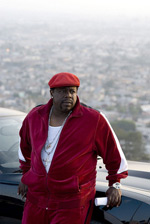Only the good cops die young in Street Kings. Okay, a lot of bad cops die young, too. In fact, there are very few cops in Street Kings who aren’t bad, on some level.
The corruption extends even to the movie’s protagonist, Los Angeles police detective Tom Ludlow (Keanu Reeves). He sleeps with a gun, drinks tiny bottles of vodka while driving, and tosses racial epithets around. And when he finds a criminal lair, he barges in and shoots everyone in sight without so much as reading anyone’s rights—even if the person in question is sitting, vulnerable and exposed, on a toilet.
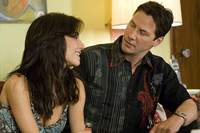
Due process, this isn’t. But when we first see Tom in action, he does rescue a couple of young women who were being kept as sex slaves, and he doesn’t kill any innocent bystanders, so in many people’s eyes—including, perhaps, the audience’s—he seems to be doing something right. Or, if not right, then at least forgivable. All he has to do is lie about the law-breaking and everyone agrees to look the other way.
What’s more, Tom almost presents what he does as a form of self-sacrifice on behalf of other people; when his colleagues show up and ask with a grin why he didn’t wait for them to join in the fun, Tom replies, “You want to see their faces every night?” The implication seems to be that Tom lives with a troubled conscience so that other people don’t have to. The problem is, the very callousness of his colleagues makes you wonder if they have consciences capable of being troubled to begin with.
A few cops do express misgivings. Tom gets a visit from Captain James Biggs (Hugh Laurie, using the same American accent and cynical, sarcastic demeanor here that he uses on House), an Internal Affairs officer who has apparently been needling Tom’s superior officer, Captain Jack Wander (Forest Whitaker), for some time. And Tom comes to believe that another officer—Terrence Washington (Terry Crews), a cop who was upset with Tom’s racism and law-breaking—ratted him out.
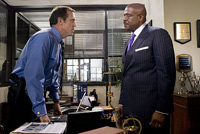
So Tom follows Washington with the intention of confronting him, but his plans are interrupted when a couple of masked gunmen show up and shoot Washington in a convenience store. Tom returns fire, which may or may not explain why the gunmen leave without actually stealing anything. But the fact that Tom was there when Washington died looks very suspicious, so his colleagues cover up some of the more incriminating evidence and shuffle Tom off to the complaints department, where he has to listen to citizens gripe about cops who are not quite as corrupt as him.
Of course, Tom does not find this at all satisfying. Cop-killers are on the loose. And, what’s more, he has just enough of a conscience to know that Washington did not deserve to die. And so, despite the fact that his colleagues keep telling him to let things go, Tom goes out of his way to learn what he can about Washington’s death, meeting with the late officer’s widow (Naomie Harris) and teaming up, unofficially, with an investigator named Paul Diskant (Fantastic Four‘s Chris Evans).
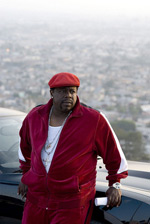
Street Kings is based on a script by James Ellroy, whose crime novels have inspired films like L. A. Confidential, Dark Blue and The Black Dahlia. (The screenplay is also credited to The Recruit‘s Kurt Wimmer and newcomer Jamie Moss.) It is directed by David Ayer, who wrote the big-screen adaptation of Dark Blue as well as Training Day, which won Denzel Washington an Oscar for his role as a corrupt cop.
So Street Kings is the work of people who know their way around stories about dirty policemen. And while it is not quite of the same caliber as those earlier films, it works well enough as a standard meat-and-potatoes example of its genre.
However, unlike at least some of those earlier films, which allowed for at least some idealism among their protagonists, Street Kings is resolutely cynical. The main character that we are asked to identify with is, after all, a law enforcement officer who continually breaks the law, even to the point of murdering his suspects. And, as always, one of the questions that hangs over a film like this is to what degree the film is asking us to tolerate his crimes, if they are done for a good cause.
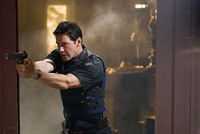
For his part, Tom doesn’t see himself as any sort of hero. When his girlfriend (Martha Higareda) tells him that good can come from bad, he replies, “In my world, the real world, bad leads to more bad.” Later, he says, “Everyone’s out for theirs. It’s the way of the world.” Finally, when Tom asks one of his colleagues whatever happened to just locking up the bad guys, his colleague replies, “We’re all bad, Tom.”
For some Christian viewers, that line will have a ring of truth and may even help to turn this movie into a sort of sermon illustration. But the person who speaks the line does so mainly to justify his own corruption, as well as to justify the way that he has corrupted others such as Tom himself; that alone should give us pause before we accept the line at face value. And the fact remains that there are hints of goodness here and there throughout the film; however, as the death of Washington shows, the people who embody these qualities don’t have a very high survival rate.
The bigger challenge posed by a movie like Street Kings is not whether everyone is evil—obviously, all real people have a mix of good and bad within them—but whether anyone needs to be evil in order to fight evil. The answer suggested by this film is not a particularly soothing one, but its deep ambivalence on this point no doubt reflects the morally confused times in which we live.
>Talk About It
Discussion starters- Is Tom as a basically good person who does some bad things? Is he a basically bad person who does some good things? Is he something else entirely? What?
- Do you agree with the corrupt cop who says, “We’re all bad, Tom”? Why or why not? How do you understand the nature of evil? What about the nature of goodness? (See Romans 2:6-16, 3:9-20)
- Tom’s girlfriend says that good can come from bad, and Tom replies, “In my world, the real world, bad leads to more bad.” Do you agree with one of them — and if so, which one? Or do they both have a point? (See Romans 8:28)
- Is it ever necessary to do evil in order to fight evil? If so, under which conditions? Is there a different standard for individual people than there is for government authorities such as the police officers depicted here? (See Romans 12:17-21, 13:1-7)
The Family Corner
For parents to considerStreet Kings is rated R for strong violence (many people are shot, lots of blood flows) and pervasive language (lots of four-letter words throughout).
Photos © Copyright Fox Searchlight
Copyright © 2008 Christianity Today. Click for reprint information.



